
















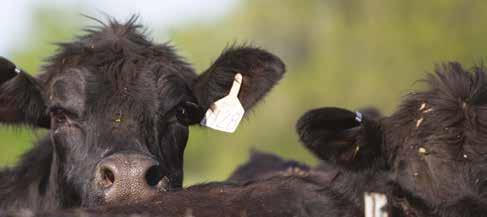



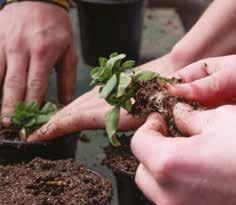




This year’s report highlights the continued strength and impact of our state’s agricultural education programs and organizations, including Missouri FFA, Missouri Professional Agricultural Student Organization (PAS), Missouri Young Farmers/ Young Farm Wives, and Missouri Agricultural Education. Collectively, these organizations represent the broad impact of agricultural education across the state — from high school students to adult learners — and highlight the work being done to build a strong and prepared agricultural workforce. At the heart of all agricultural endeavors is the production of food, fiber and natural resources. As new technologies and scientific advancements rapidly change the

way we farm, process and market agricultural products, it’s easy to get caught up in innovation and lose sight of our roots. But those roots — grounded in production agriculture — are essential to sustaining both our industry and our communities. Missouri’s agricultural education programs help students develop the knowledge and skills to not only understand these fundamentals, but also to apply them in ways that improve lives and feed the world.
Central to this effort is the integrated, three-circle model of agricultural education: classroom instruction, supervised agricultural experiences (SAEs) and leadership development through organizations like FFA. This model ensures students receive well-rounded, hands-on learning that translates to realworld success. Whether a student is exploring a career in animal science, agricultural mechanics,
plant systems or environmental sustainability, the three-circle model helps connect learning to life.
As we prepare students to be future leaders in agriculture, we must continue to emphasize high-quality classroom instruction. Missouri’s agricultural education programs are turning out successful, motivated students not by chance, but because of the committed teachers and strong curriculum that support them. These students become advocates, educators and innovators — helping consumers understand where their food, fiber and shelter comes from and why agriculture matters.
Thank you for your continued investment in Missouri Agricultural Education. Together, we are cultivating the future of agriculture.
Keith Dietzschold, Director Missouri Agricultural Education Keith
Out AG ED
Grow wise and informed consumers.
Assist with workforce development.
Meet the needs of traditional and nontraditional agricultural education students.
Help students develop practical and leadership skills.
Partner Organizations
Missouri FFA Association
Missouri FFA Alumni & Supporters
Missouri FFA Foundation
Missouri Professional Agricultural Student Organization
Missouri Vocational Agriculture Teachers Association
Missouri Young Farmers & Young Farm Wives
P.O. Box 480, Jefferson City, MO 65102
Phone: 573.751.3544
State Staff:
Teresa Briscoe, Lee Crabtree, Marie Davis, Keith Dietzschold, Lisa Evans, David Higgins & Jim Spencer
Communications Consultant: Joann Pipkin | Show Me Agri-Comm

To cultivate the next generation of leaders for the agricultural industry and our communities.
Grant Funding by Program
SAE Grants
Golden Owl
Horizon/Rising Sun Grants
Learning by Doing Grants
Proficiency Plus Scholarships
Strategic Plan Priorities Guide
Missouri Agricultural Education
COMPREHENSIVE PROGRAM REACH
QUALITY CURRICULUM AND RESOURCES
AGRICULTURE, FOOD AND NATURAL RESOURCES LITERACY
QUALITY INSTRUCTION AND INSTRUCTORS
Agricultural education envisions a world where all people value and understand the vital role of agriculture and natural resources in advancing personal and global well-being.


Through classroom laboratory instruction, agricultural education students use unique problem-solving skills.


Ag education students gain handson experience outside the classroom through their Supervised Agricultural Experience (SAE) .

Leadership development activities through involvement in FFA, PAS, Young Farmers/Young Farm Wives and MVATA promote personal skill development.
Missouri agricultural education programs.
Students enrolled in Missouri agricultural education programs.
High school agricultural education graduates in 2023.
365
30,454
5,115

Fifty years ago, one U.S. farm produced enough food to feed about 76 people.
Today, that number has jumped to 169! The figure is more remarkable when learning the amount of land available for production agriculture has decreased by more than 31 million acres. How are farmers achieving this exceptional output with less land?
Through countless innovations, farmers are able to improve efficiency and production. Skills and knowledge continue to adapt to today’s agricultural workforce needs. Students need the core basics of raising plants and animals, but they also must be able to apply scientific principles, incorporate precision agriculture strategies, make smart financial decisions and effectively communicate. That means we ask more of our teachers and students in agricultural education.
The Missouri FFA Foundation recognizes the challenges faced by teachers and students and is committed to helping provide the resources needed to meet those challenges.
One strategy to provide support is by funding conferences and conventions for the Missouri FFA Association, Missouri Young Farmers/Young Farm Wives, Missouri Vocational Teachers Association and Missouri Professional Agriculture Student Organization where new knowledge and peer networks develop. In addition, students and teachers are recognized for their hard work through awards presented at these state-wide events.
Additionally, more than $44,000 was invested in teacher professional development, allowing them to upgrade their skills in agriscience, food science, small engine repair, drone aviation and other areas this year.
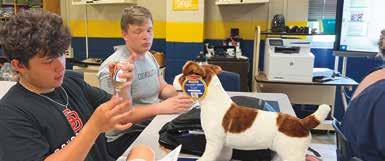
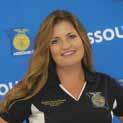
Heather Dimitt-Fletcher, Executive Director Missouri FFA Foundation
Grants were another key strategy the Foundation used. SAE Grants were awarded to students looking to start or expand their own agribusiness. Local ag ed programs received grants to enhance and improve facilities, technology, equipment and more. These grants brought to life greenhouses, food science labs, drone aviation programs, hydroponic systems and ag mech buildings. When combined with local community support, grant projects resulted in more than $1.27 million being invested in enhancing and improving agriculture education across Missouri—investments crucial to the future of agriculture! Thanks to the generosity of our sponsors and donors, the Missouri FFA Foundation has impacted agricultural education across the state. Thank you for making that possible!
Heather

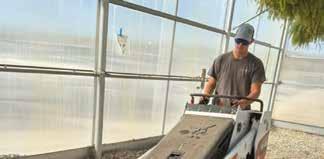
To secure strategic partnerships and financial resources to enhance, strengthen and support the educational and leadership opportunities that promote premier leadership, personal growth and career success for Missourians in agricultural education.
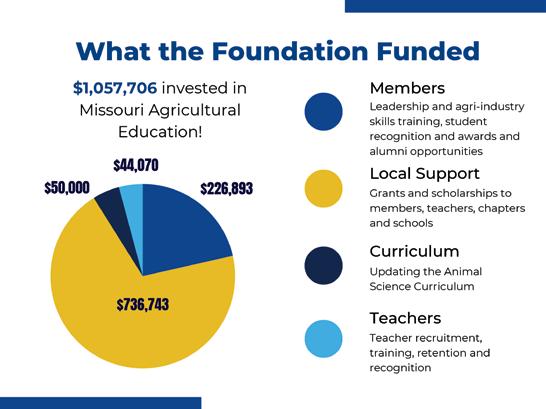

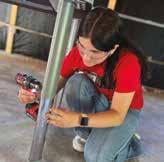
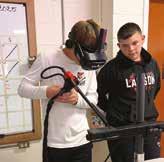
Community is at the heart of agriculture, and agriculture is often the heart of communities.
Preparing for the future of agriculture means investing in students, teachers and programs at the community level. During the past year, the Missouri FFA Foundation funded more than $736,743 in scholarships and grants for students, teachers, FFA Chapters and agricultural education programs in local communities. Additionally, more than $510,198 has already been committed for the 2025-2026 school year.
From student SAE Grants ranging from $500 – $1,000 to Learning by Doing Grants ranging from $1,000 – $5,000 to Horizon/Rising Sun Grants ranging from $10,000 – $50,000, the Foundation leverages individual donations, corporate sponsorships and grants to invigorate ag education across Missouri.
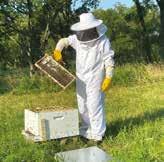

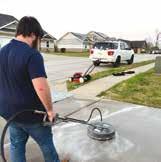
I believe in the future of agriculture with a faith born not of words, but of deeds...”
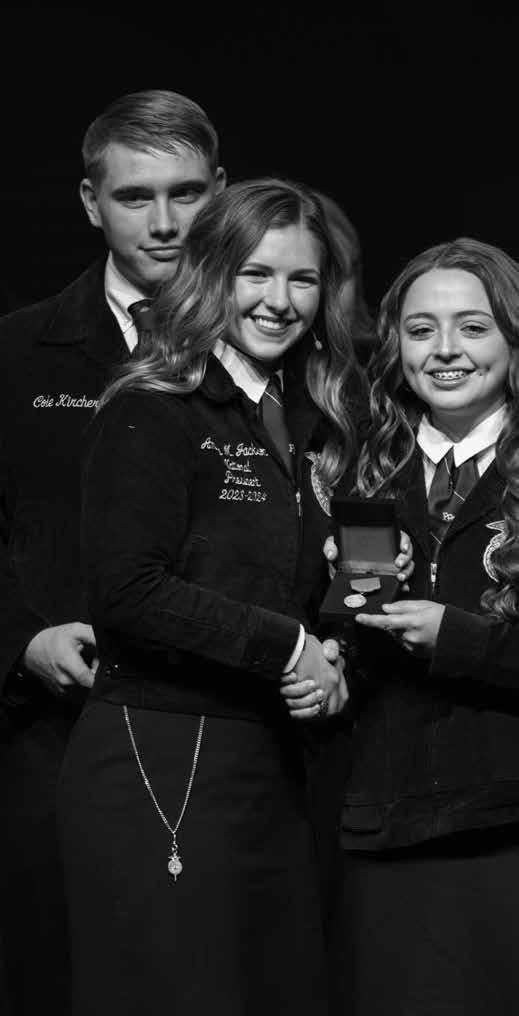


Learning
FFA members learn these 12 words when they first join FFA and agricultural education. These words help describe the impact agricultural education has on its members and the communities they live in. The nation’s largest youth organization is more than just blue corduroy jackets and plaques on a wall. FFA is about growing ourselves, growing leaders, so in return we can grow our communities and the world of agriculture.
Agricultural education offers students the opportunity to put this motto to use. Through Career and Leadership Development Events, students can test their knowledge of topics learned in the classroom. Through Supervised

Agricultural Experiences, students develop skills that challenge them to dive deep in the industry, far beyond their FFA careers. Students are building skills necessary for their future. Not only that, but members can be leaders in their communities in many ways. With emerging experiences in agriscience on the horizon, opportunities for student involvement only continue to exist across all segments of the industry.
With over 31,000 agricultural education students and more than 26,000 FFA members across Missouri, new experiences exist for students every day. Agriculture is always growing, changing and adapting. My hope is that we welcome these changes with open arms and use them to light the way for the future.

$76,490,918
Total SAE-Generated Student Labor Income
$3,934 Average SAE-Generated Labor Income Per Student 1. Placement, Food Production Systems







1. State FFA Officers visited a record 310 of the 365 chapters in Missouri.
2. Missouri tops the nation for the third consecutive year for the most American FFA Degrees awarded.
3. The Osceola FFA Chapter was in the top three in the nation in the Strengthening Agriculture division of the National Chapter Award Program. Centralia FFA was in the top 10 within the Strengthening Agriculture division of the National Chapter Award Program.
4. Missouri is home to five National winning Career Development Event (CDE) teams: North Shelby, Ag Mechanics, Agronomy and Farm Business Management; Fair Play, Milk Quality; Silex, Agricultural Issues Forum. High individuals in CDEs include: Dallas Hardt, Fair Play, Milk Quality & Dairy Products; Emme Jones, North Shelby, Farm Business Mangagement; and Esmarelda Franklin, Nevada, Livestock Evaluation.
5. Two Missouri FFA members won National Proficiency awards: Ava Bullard, Ashland FFA, Diversified Horticulture and Cade Claycomb, Trenton FFA, Dairy Production— Entrepreneurship.
537
26,828 FFA Members Agricultural Education Teachers
365 FFA Chapters
Missouri public school districts offering agricultural education
66%
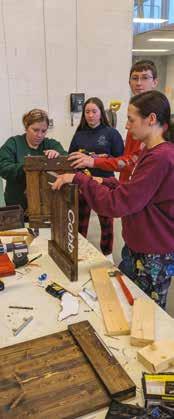

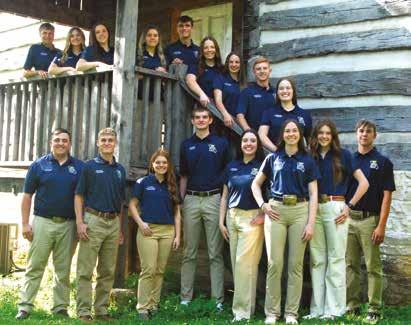
Students whose lives are impacted by FFA and agricultural education will achieve academic and personal growth, strengthen American agriculture and provide leadership to build healthy local communities, a strong nation and a sustainable world.
(above, bottom row l-r) Matthew Lakey, Ryatt Haggerman, Ivy Elwell, Seth Engeman, Sophie Geppert, Noah Groose, Lindsay McDonald and Gage Swindler. (stairs, top-bottom) Taylor Nothdurft, Maddy Rash, Braxton Watts and Annie Neely. (back, l-r) Cash Honeycutt, Abigayle Lett, Cierra Britton, Harlee Beck and Kolton Stolba.

Addison Rogers of the Pleasant Hope FFA Chapter stood at the state agriscience contest her freshman year nervous and shaking, not knowing what to expect.
Thankfully, the feeling only lasted until the judges walked over, as her nerves calmed and she experienced an overwhelming sense of belonging and calm.
“My advisor, Mr. Parrack, convinced me to give agriscience a try by allowing me to do my first project with my best friend and assuring me nothing had to be memorized,” Rogers says. “But standing in a room full of FFA members at state as I was handed a first place plaque was intoxicating. It was then I knew I was where I belonged.”
Rogers went on to pursue agriscience throughout her FFA career and was named State Star in Agriscience at the 97th Missouri FFA State Convention. She earned
this honor through innovative research projects and a dedication to agricultural science.
Her agriscience Supervised Agricultural Experience began her freshman year with that very first agriscience project. Rogers and a friend studied the effects of extreme temperatures on motor oil.
“I wanted to test something that really keeps agriculture moving,” Rogers says. “Oil might not be the first thing you think of in farming, but without it, a lot of modern equipment wouldn’t run.”
After overcoming a fiery mishap in the shop, she discovered synthetic blend had the least evaporative loss, while full synthetic performed best in freezing temperatures. That project earned first place at the State Agriscience Fair and 10th in the nation.
In her sophomore year, Rogers conducted two award-winning studies. One tested whether third graders retained more agricultural knowledge through hands-on or auditory learning, and another examined the freeze resistance of copper, PEX, and PVC pipes after her school greenhouse’s plumbing froze.
“That project came straight from a real-life problem we had,” Rogers explains. “I wanted to find a solution
that could help farmers and ag programs avoid costly damage.”
Beyond her research findings, Rogers has also learned the importance of practice.
“I would practice at home, during school, on bus rides and even during softball practice,” she says. “I would think through all the possible questions and how I could answer them. I’m where I am now because of the time I took to practice.”
Rogers plans to pursue a degree in agricultural education and become an elementary ag teacher in a rural community in the future. She would like to utilize the real-world application of her agriscience
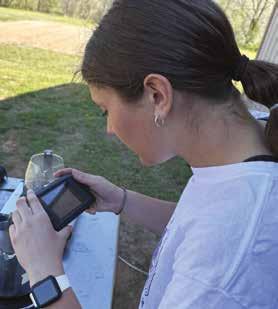

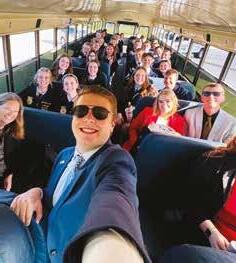
The Missouri FFA Foundation and Missouri Agricultural Education appreciates the support of Missouri Corn Merchandising Council as a presenting sponsor of the Missouri FFA HYPE Academy.
FFA members spend their time in the blue jacket learning skills to prepare them for career success.
Whether it is animal science, plant science, welding or even public speaking, the experience agricultural education students receive is hands on and comprehensive. But how do we ensure they are ready to share their knowledge and skills with others? Enter the Helping Youth Prepare for Excellence (HYPE) Academy.
HYPE is a summer academy for the top 30 incoming seniors across the state, sponsored by Missouri Corn. It focuses on advocacy and communication skills while teaching students more about hot agricultural issues.
“Participating in the Missouri FFA HYPE Academy was an enriching experience that strengthened my skills in advocacy, communication and leadership,” says Logan Lane, a senior St. Clair FFA member. “The program provided a unique opportunity to engage with agricultural issues on a professional level, interact with key industry leaders and build a network of peers who are also passionate about the future of agriculture.”
After students conduct research with a small group on their assigned agricultural issue, they have the opportunity to present in front of legislators, an invaluable real-world experience.
“My favorite part of the Academy was the mock legislative hearings at the State Capitol,” Lane explains. “This was a powerful, hands-on experience that allowed us to apply our knowledge and skills in a realistic setting. It gave me a deep appreciation for the legislative process and the power of advocacy.
“It is not enough to simply be involved in the industry; we must also be prepared to share our stories, correct false information and engage in meaningful conversations with those outside of our field, including elected officials.”
Lane says HYPE equipped him with the confidence and tools to do just that. He believes more members should consider the opportunity. He concludes, “This experience will not only build your professional skills, but also connect you with a supportive network of future agricultural leaders across the state.”
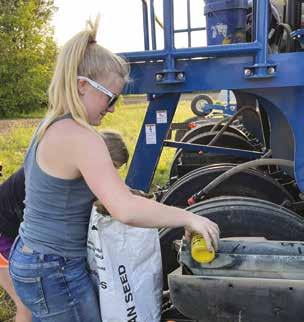
McKenna Claborn remembers at a young age riding in the passenger seat with her Dad while he made sales calls, scouted crops and attended customer appreciation events.
After her family opened Prairie View Seed, she became a righthand for the operation. Those experiences are helping pave the way for the Silex FFA member’s future as she prepares for a career as an agronomist.
“Working for our family business has taught me the importance of customer service while preparing me for my future career,” Claborn explains.
The FFA member combined those business experiences with working at a local bank and managing a lawn care operation for her Supervised Agricultural
Experience (SAE). The three opportunities together helped her earn the Missouri FFA State Star in Placement award.
Today, she loads trailers, treats soybeans and plants test plots. Looking ahead, she has set her sights on independently operating the KSI soybean prescription treater by the 2025 planting season. “I am eager to learn how to calibrate each product that goes through the mixing drum before I start treating large volumes of seed,” she explains.
Claborn’s role at Silex Banking Company has given her a deeper understanding of agricultural finance. Starting with the basics, she now processes loan payments and confidently assists customers with account inquiries.
“The bank has expanded my understanding of agricultural financing and given me practical finance skills,” Claborn says. “I am now able to explain and answer customer inquiries independently, instead of double-checking with other employees. I have also acquired problem-solving and critical thinking skills that I would not have gained if it wasn’t for this work experience.”
Through the lawn care portion of Claborn’s SAE, the young
entrepreneur has grown the enterprise from just 10 acres in her first year to now managing 20 acres weekly. Her goal is to continue to increase the number of acres under her care.
“My role shifted from strictly a lawn mower to an all-encompassing lawn care provider,” Claborn says. “Instead of just mowing, I can make management decisions on fertilizer application and the best ways to dispose of brush. I also help customers decide what plants are best suited for landscaping projects.”
Though long workdays and unpredictable weather bring ample challenges for Claborn, she views them as opportunities for growth. With perseverance and focus, Claborn cultivates her future as an agronomist.

Agriculture not only gives riches to a nation, but the only riches she can call her own.”
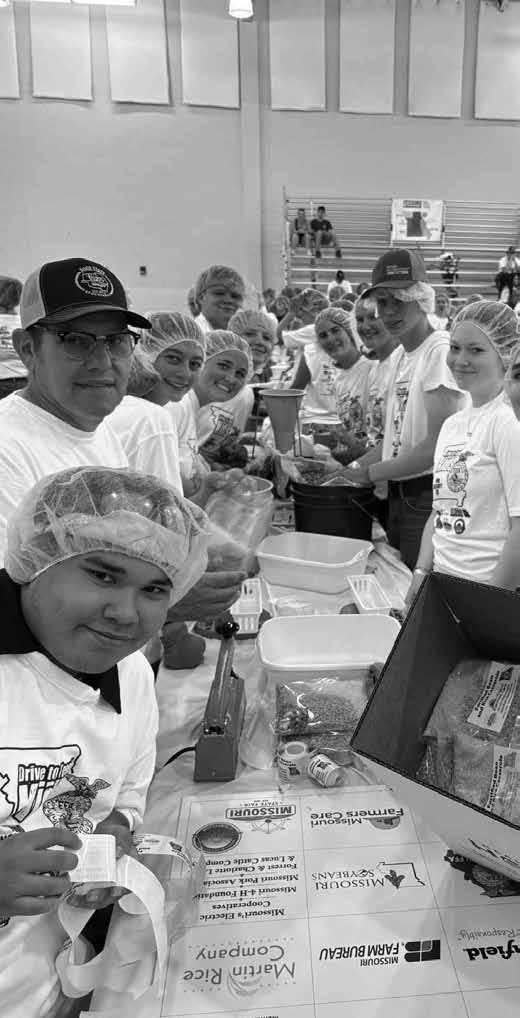
“We hope to show students the connection between farmers and food through our Program of Activities. At the same time, we strive to bring awareness to our community on the importance of agriculture.” Jill Chapman, Agriculture Education Teacher & FFA Advisor, Osceola Public Schools
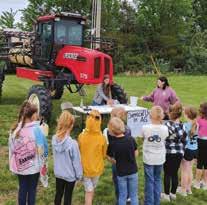


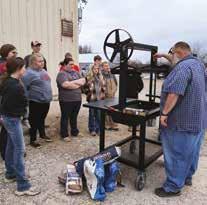

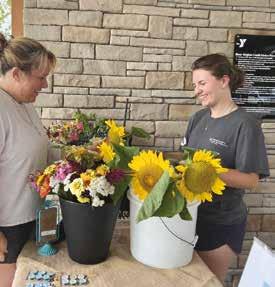
It all started in her mom’s flower garden in the family’s back yard.
Ashland FFA member Ava Bullard turned her flower bouquet making into a profitable booth at the local farmers market and eventually a thriving floriculture business.
Today, Bullard’s responsibilities in the blooming business include planting, harvesting, arranging and selling florals to customers in surrounding areas. With assistance from National FFA SAE grants, Bullard has grown her operation to include floral coolers, a greenhouse, sophisticated irrigation systems and more.
The young entrepreneur admits that her project didn’t come without challenges. Like many other FFA members, she learned by trial and error.
“This has occurred when assessing the different varieties of flowers and greenery that I grow,” Bullard says. “In my first year, I had an overabundance of flower varieties and very few greenery varieties. I found myself becoming overwhelmed with the amount of flowers that I wasn’t using because I either didn’t like how they looked or they didn’t last very long.”
AVA BULLARD
National FFA
Proficiency Winner
DIVERSIFIED HORTICULTURE
“With this money, I purchased a device called a Cool Bot and an air conditioner window unit to use to create a walk-in flower cooler in a cellar,” Bullard explains. “In my junior year, I applied for, and was awarded, a second SAE grant. With this money I bought supplies to build a greenhouse.”
Bullard’s parents allowed her to use a 1/2 acre of land for the project. Her SAE helped Bullard earn a National FFA Proficiency award in Diversified Horticulture.
As an FFA member, Bullard participated in the Floriculture Career Development Event, as well as floral arrangement competitions. This paired, with her hands-on SAE experience, opened Bullard’s eyes to every step that goes into growing flowers from seeds. She also found a passion for the cut flowers that make up beautiful bouquets and arrangements.
Time spent growing her SAE has sparked a path for her future career. Bullard plans to use what she has learned to pursue a degree related to floriculture and agribusiness with her sights set on flowers in her future.
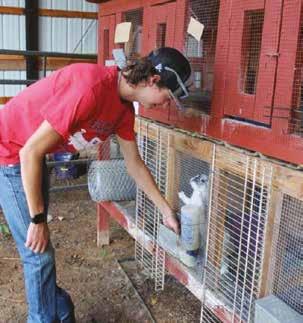
It all started with one bottle calf. Today, Fredericktown FFA member Pakey Matthews finds himself raising much more than young bovine.
Matthews’ Supervised Agricultural Experience (SAE) journey found him growing his cow herd into more than 50 breeding females. From there, his interests expanded to Shropshire sheep, miniature Highlands and other livestock, eventually leading him to explore niche markets.
“I never imagined that one calf could turn into this,” Matthews says. “But each step taught me how to take a small opportunity and grow it into something bigger.”
Currently, Matthews’ SAE includes raising and marketing a wide variety of animals—ranging from tortoises, hedgehogs, sugar gliders and parrots to alpacas, mini
donkeys, potbelly pigs and microsquirrels. Matthews purchases animals wholesale or in groups, then individually cares for them to ensure they are healthy and friendly before resale. He also breeds his own stock, incubating up to 500 eggs at a time and carefully raising offspring until they are ready for customers.
“It takes a lot of work to get the conditions right, but it’s rewarding when you see the results,” Matthews says.
Matthews’ business has grown to include over 200 reptiles, which he markets through Morph Market, shipping more than 15 packages a week across the country.
Along the way, he has faced challenges such as disease prevention and facility improvements. With the help of his father, he added insulated barns, heaters and a dedicated “warm room” for sensitive species. He also implemented strict quarantine and vaccination procedures to protect his animals.
“I never imagined that one calf could turn into this. But each step taught me how to take a small opportunity and grow it into something bigger.”
—Pakey Matthews Fredericktown FFA Chapter 2025 State Star in Agribusiness
Looking ahead, the Missouri Star in Agribusiness plans to expand his enterprise into a fullscale exotic livestock and reptile operation.
“My goal is to keep building connections in agriculture and to grow a business that reflects my passion,” he says.

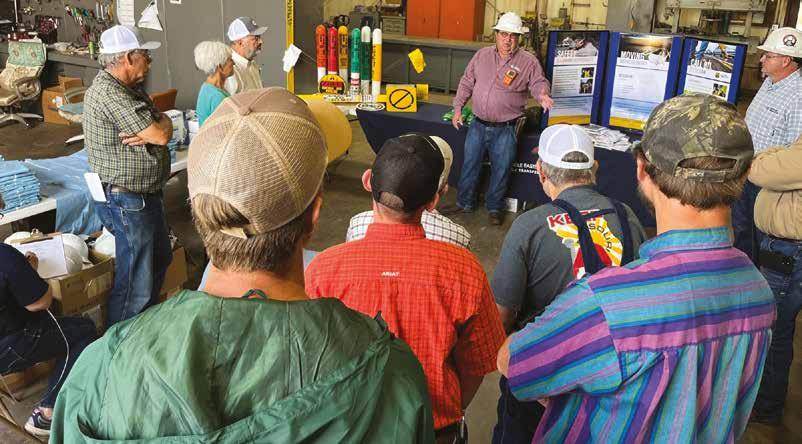
3,100 20 295
agriculture instructors with part or all of their time scheduled for adult instruction in 2024-25. adults enrolled in 2024-25.
130+
members of Young Farmers/Young Farm Wives in 15 active chapters in 2023-24.
farm families enrolled in the Farm Business Management Analysis program.
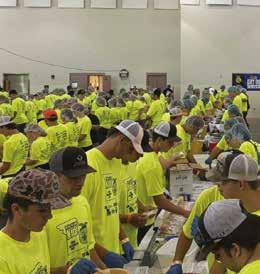
$899,961
Economic Impact
Growing the next generation of leaders who will change the world.
29,031 Service Hours
4,983 Volunteers
147 Missouri FFA Chapters completing service activities
37 Missouri FFA Chapters receiving grants

“Communication and discipline can be learned through livestock evaluation, but the connections and people I met along the way are truly what meant the most to me as both will help me going forward to be successful in the game of life.”
—Esmerelda Franklin, Nevada FFA, 1st Place Individual National Livestock Evaluation Career Development Event
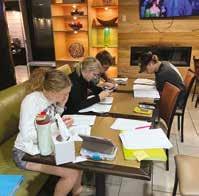
“Something I developed during the farm management competition that will definitely help me in the future is the ability to work under pressure. Figuring out how to apply the knowledge I had to answer the questions quickly was hard, but it is something I now use all the time. Whether it’s a test or a real life situation, being able to work effectively under pressure is important.”
—Emme Jones, North Shelby FFA, 1st Place Individual National Farm Management Career Development Event

“The Milk Quality CDE taught me the importance of quality control in dairy products, how to identify defects, and the value of teamwork and time management. It gave me a deeper appreciation for food safety and the role it plays in agriculture.”
—Dallas Hardt, Fair Play FFA, 1st Place Individual National Milk Quality and Dairy Foods Career Development Event
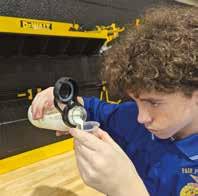

The Agricultural Education integrates Classroom Instruction, Supervised Agricultural Experience (SAE) and FFA to provide a comprehensive and wellrounded learning experience for students in Agriculture, Food and Natural Resources systems.
A well-rounded program engages students in real-world, hands-on experiences that use knowledge and skills learned in the classroom, as witnessed by the North Shelby agricultural education department and FFA chapter.
“Curriculum drives what we do,” says Harold Eckler, an ag ed teacher and FFA advisor at North Shelby. “We teach curriculum in the classroom while trying to help students develop their leadership potential. We’re teaching them leadership skills, such as public speaking or parliamentary procedure, in the classroom. Then, we use FFA opportunities to take what we learn in the classroom one step further.”
For example, students might be planning their chapter’s mud volleyball event, Eckler shares. They’re taught parliamentary procedure in the classroom, use it in chapter meetings to plan details of the event, then see it to fruition.
Career Development Events (CDEs) and Leadership Development Events (LDEs) go a step further to build upon those same skills.
“CDEs are curriculum-driven; it is all integrated,” Eckler says. “Every student in the classroom learns the material that the contests build on. For example, every student in Ag Science II is learning about agronomy and plant science. Then, the CDEs are made up of hands-on learner outcomes that build upon what is taught in the classroom.”
To determine CDE and LDE team participants, Eckler has students first choose a pathway.
“In the classroom, we introduce the topic and develop interest and basic skills. As students go throughout their ag classes, their interests develop. As advisors, we help guide them toward their interests and strengths, which could also affect their future careers, as well.”
Although every student is exposed to the same introductory topics, some students enter the ag education program with a predisposed plan, Eckler says.
“We have a rich tradition of participation in LDEs and CDEs, so students are coming in knowing what they want to do. Maybe their siblings did ag mechanics, their parents were on a national team or their neighbor has memories of a certain CDE. They come in their freshman year wanting to be a part of that, too.”
Once students find a passion area, they separate into teams and set the pace for the year ahead.
“We set expectations at the beginning of each CDE season,” Eckler says. “We want to work with each student’s goals and pair them with other students who are like-minded. Our preparation varies, depending on the students and team.”
This integrated approach prepares students with the knowledge and skills they need to succeed in CDEs, LDEs and beyond. In 2024, North Shelby earned first place in three CDEs at the national level, Ag Mechanics, Farm Business Management and Agronomy.


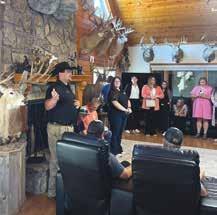

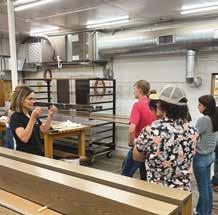






Missouri Professional Agricultural Student Organization Crowder College
President
Samantha Koehleer Crowder College
Vice President
Cody Jedlicka
Missouri State University-West Plains
Secretary
Aubrey Schreckhise
North Central Missouri College
Treasurer
Sydney Radford
Missouri State University
Mineral Area College
Missouri State University-West Plains
Moberly Area Community College
North Central Missouri College
Northwest Missouri State University
Ozarks Technical Community College
St. Charles Community College
St. Louis Community College
State Fair Community College
State Technical College of Missouri
Three Rivers Community College
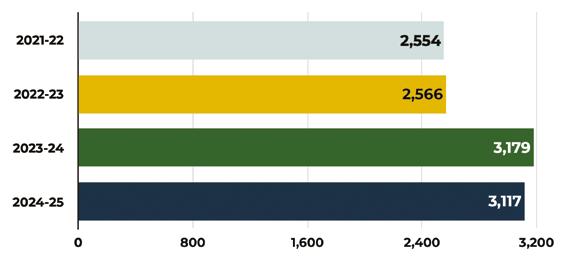
Agriculture is our wisest pursuit, because it will in the end contribute most to real wealth, good morals and happiness.”
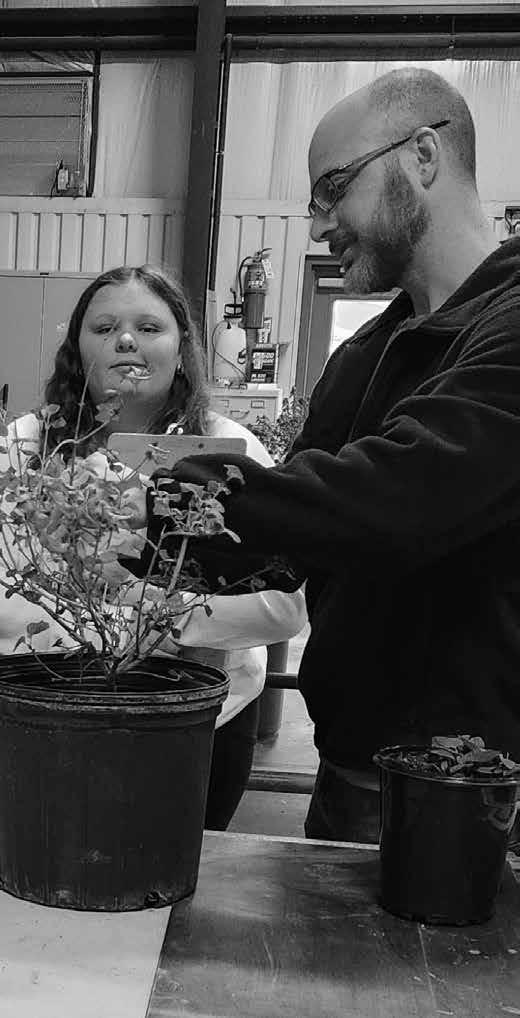
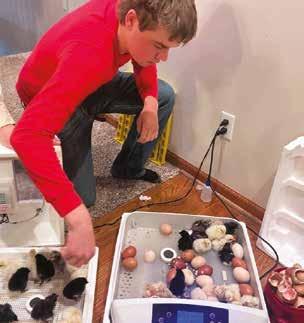
Early mornings filled with chores and late nights of checking livestock made for a busy high school career for Braymer FFA’s Gage Swindler.
For Swindler, farming is not just a passion, it is a way of life. This mindset and hard work paid off as he was named State Star Farmer at the 97th Missouri FFA State Convention.
“I put in time before school, after school, between practices,” Swindler says. “Raising livestock is an all-day venture. My love for agriculture keeps me going. I always strive to make improvements and grow my operation. It is what I love to do.”
Swindler’s Supervised Agricultural Experience (SAE) involves managing diversified livestock, featuring beef, swine and poultry operations.
His beef project features a registered Angus and Gelbvieh cow-calf operation, where he markets bulls and show heifers while selling feeder calves. Through artificial insemination (AI) and embryo transfer, Gage has more than doubled his herd size and improved genetics, producing cattle that thrive both in the pasture and the show ring.
In addition, Gage operates a farrow-to-finish swine operation, raising Chester White and Berkshire sows. He uses AI to improve meat quality and markets butcher hogs directly to consumers, focusing on efficiency and profitability. His poultry project rounds out his SAE, where he hatches chicks, raises broilers, and processes meat chickens for local customers.
“Of the three species of livestock I raise, I am most passionate about my beef cattle herd,” Swindler says.
The State Star Farmer currently attends the University of Missouri, pursuing a degree in agribusiness management. He intends to expand his SAE and remain active in the agricultural industry throughout college and beyond, with plans to
expand his family’s farming operation while also working to build his own. Swindler hopes to pursue a career in agriculture business in the future.
“This award reflects years of hard work,” Swindler says.
“Agriculture has shaped who I am, and I’m excited to keep building my future in it.”


Employability Story
“Agriculture is so broad and diverse that being able to teach it to students and community members opens doors for not only them, but also me. No one on earth knows everything, so be open to learn new things. Agriculture is an awesome way to accomplish that!”
—Alissa Swindell Agriculture Instructor,
Delta
College of the Ozarks
Hannah Evans
Rebekah Evans
Missouri State Ally Golian
Aubrey Jung
Northwest Missouri State Kiley Mattson
Kearsten Peterson
Southeast Missouri State Abigail Dahmer Mindi Hanneken
University of Central Missouri Lindsey Ball Kailey Narron
University of Missouri Izzy Freymuth Annabelle Searcy
The Missouri FFA Foundation and Missouri Agricultural Education thanks these presenting sponsors:
Missouri Ag Ed Calendar
Cutting Edge Curriculum
Missouri Ag Ed Teacher Directory
Missouri Farm Bureau
Missouri Teach Ag Program
MFA Inc.
The Missouri Teach Ag Program is funded in part by CHS Foundation and MVATA.
Missouri Vocational Teachers Association
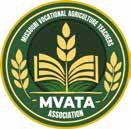






Ideas Unlimited
Makayla Piotrowski, Fair Grove
Jess Clonts Memorial Scholarship
Erin Creason, Hamilton
Lifetime Achievement
Dr. Jim Hutter, Missouri State University
Teacher Mentor: Josh Bondy, Paris
Teachers Turn the Key Scholarship
Morgan Looten, Versailles
Outstanding Ag Educator
Angel Roller, Seneca
Outstanding Ag Ed Program Farmington
Outstanding Early Career Ag Ed Teacher
Amanda Twenter, Tipton
Outstanding Service
Dr. Donn Russell, College of the Ozarks
Visionary Impact
Rusty Black, State Senator, 12th District
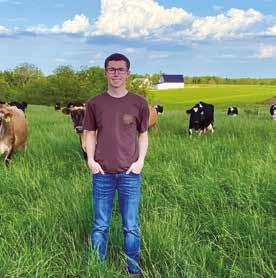
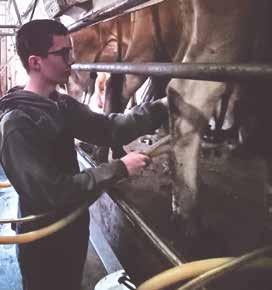
CADE CLAYCOMB
National FFA
Proficiency Winner
DAIRY
PRODUCTION
Cade Claycomb wants to improve and strengthen the genetics of his Jersey dairy cattle herd. It’s a goal he’s working to achieve with the help of in vitro fertilization (IVF) and embryo transfer.
The Trenton FFA member’s Supervised Agricultural Experience (SAE) consists of more than 40 registered dairy females. With the use of sexed semen, he was able to grow his herd, achieving a high success rate. His SAE work helped him earn the National FFA Dairy Production Proficiency Award at the 97th National FFA Convention and Expo.
Starting with five Jerseys, Claycomb aggressively expanded his dairy operation. Developing high-quality genetics has always been a priority, which led the up and coming dairy producer to work with Trans Ova Genetics through the IVF embryo transfer process to breed most of his registered cattle.
Claycomb’s dairy herd averages 9,400 pounds of milk production per week. He markets milk through the Dairy Farmers of America cooperative, in addition to selling to
Hiland Dairy Foods in Kansas City for use in milk products like fluid milk and Belfonte Ice Cream.
Keeping up with dairy farm tasks is one of the challenges Claycomb faced in his SAE. Daily chores like feeding calves, milking and checking cows and feeding hay required Claycomb to find balance between those duties, school work and extracurricular activities.
“Another challenge is managing dairy nutrition,” he explains. “I spend quite a bit of time working with my dad and a nutritionist to develop rations. Dairy nutrition is especially important for developing quality heifers and keeping milk production high.”
To help ensure his Jersey herd is fed an appropriate ration, Claycomb consults with a nutrition company.
As an FFA member, Claycomb participated in the Grasslands, Dairy Cattle Evaluation and Forestry CDEs, all of which paired nicely with his hands-on SAE experience. He currently attends Oklahoma State University, pursuing a degree in agriculture communications. Following college, Claycomb plans to return to the family dairy farm to expand his operation and serve as an advocate for the dairy industry.

FFA will always hold a special place in my heart. It built the foundation for my career in agribusiness and the growth of my Simmental cattle operation. The lessons I learned and the opportunities I was given shaped not only my professional path but also my commitment to leadership and service. That’s why I’ve always looked for ways to give back—whether it’s supporting local fruit sales, coaching greenhands in Creed contests, preparing students for officer interviews, or judging events. Each experience is a chance to invest in the next generation, just as others once invested in me.
The first line of the FFA Creed captures the heart of my support: I believe in the future of agriculture, with a faith born not of words but of deeds. For Missouri FFA alumni, one of the greatest deeds we can perform is to give back to the organization that gave so much to us. Supporting the Missouri FFA Foundation ensures we carry forward the promise of FFA and all of agricultural education—for today’s students as well as for the future of farming and related industries.
Chief Commercial Officer, EVOIA Missouri FFA Foundation, Board of Directors







205 Jefferson Street | P.O. Box 480 Jefferson City, MO 65102

The Department of Elementary and Secondary Education does not discriminate on the basis of race, color, religion, gender, gender identity, sexual orientation, national origin, age, veteran status, mental or physical disability, or any other basis prohibited by statute in its programs and activities. Inquiries related to department programs and to the location of services, activities, and facilities that are accessible by persons with disabilities may be directed to the Jefferson State Office Building, Director of Civil Rights Compliance and MOA Coordinator (Title VI/Title VII/Title IX/504/ADA/ADAAA/Age Act/GINA/USDA Title VI), 5th Floor, 205 Jefferson Street, P.O. Box 480, Jefferson City, MO 65102-0480; telephone number 573-526-4757 or TTY 800-735-2966; email civilrights@dese.mo.gov.







